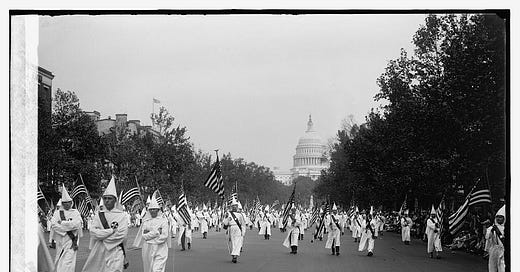Politics in the US is overwhelming. It’s tempting to tune out the chaos, but democracy in the US depends on whether we pay attention now.
“You may not be interested in politics, but politics is interested in you.” It’s not clear who originally said this—the earliest attribution I can find is to 19th-century French writer Charles de Montalembert—but its meaning is fairly clear. Politics affects us all, whether or not we choose to pay attention. We’re political animals in the sense that we live and make decisions together in political communities, but not in the sense we necessarily enjoy the work of ensuring those communities work well. Politics isn’t so much our highest calling as an often onerous prerequisite to the lives we want to live; we engage in it to create a society that makes meaningful lives possible.
In other words, I’m as sick of this as you are. I’d prefer to write about almost anything else. I resent the demand that constant national drama places on our attention. American politics has become an relentless denial-of-service attack on our day-to-day lives, crowding everything else out and overwhelming us. Most of us can’t afford to devote our attention to politics for long. We simply don’t have the spare capacity to separate fact from fiction, much less to figure out how to defend our political system. We have jobs, family responsibilities, and projects of our own. In the absence of some clear catalyst for action, we mostly just go about our lives.
But we can’t afford to just scroll away. The Trump administration—enabled by a compliant Republican Congress—is taking a wrecking ball to American institutions and alliances. As Larry Diamond lays out in the essay I shared with you last week the administration’s actions are a severe threat to democracy in the US. Steven Levitsky and Lucan Way likewise argue in Foreign Affairs—another essay I highly recommend—that the we’re on the cusp of competitive authoritarianism. In competitive authoritarian systems, incumbents use the machinery of government to persecute their political opponents and make it difficult for them to win elections—something the Trump administration is already doing to a shocking degree. Longtime White House correspondent Peter Baker recently wrote that sources are increasingly afraid to talk to him for fear of retaliation and compared the mood in Washington to Moscow when Putin was consolidating power in Russia. The fantasy of a benign, capable dictator who will relieve us of our responsibility to attend to politics is appealing. But authoritarians are much less likely to be some ideal Marcus Aurelius than they are to be demagogues and kleptocrats who serve only their own interests. The lesson of history—one we don’t want to learn again from firsthand experience—is that in the absence of democratic accountability what you get is not good government but corruption and oppression.
Democracy is unfortunately always something that a nation must be doing. We don’t get to choose the challenges we face. Our freedom to live our lives the way we choose is made possible by institutions built over many years that work in the background to ensure we live in a peaceful, prosperous society. Those institutions have generally allowed us to take politics for granted—and have insulated us from the worst violence of politics—but they’re now under concerted attack. Since under authoritarianism what you can do largely depends on your relationship with the government, it won’t free us from politics if our democratic institutions deteriorate; instead, politics in one form or another will consume our lives.
I recently talked about forecasting with and on CIGI’s excellent Policy Prompt podcast. If you find this newsletter valuable—and if you can afford to—I ask that you support my work by becoming a paid subscriber. And please share this post with others!







